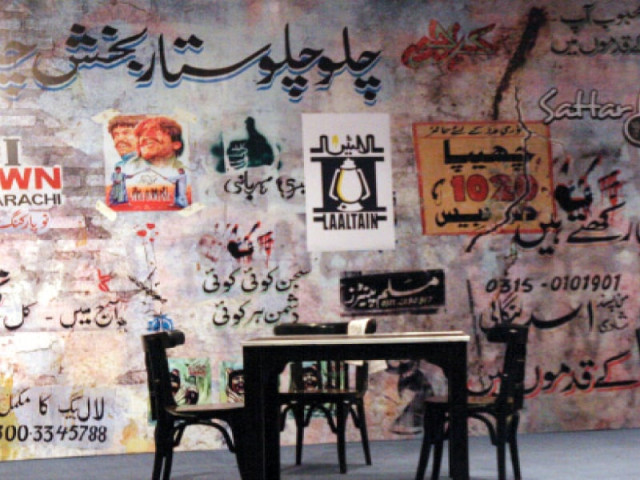Going public: The people of the city should hold all the [sp]aces
Durriya Kazi and Arif Hasan discuss public spaces and their reclamation.

The audience at the Festival of Ideas 2014 organised by Khudi Pakistan had gathered inside Karachi University's (KU) HEJ Auditorium were shown a translated Carl Sagan video about how the astronomer felt upon seeing the planet from space; nothing more than a speck of dirt.
After the video, the speakers - KU visual studies department dean Durriya Kazi and architect Arif Hasan - zoomed in closer to home, to Pakistan and to Karachi and to the public spaces therein.
Kazi, well-dressed and silver-haired, was the first to speak. She talked about how public spaces are being taken over by 'virtual' ones, how Facebook is replacing cafes and parks. Hasan, just as well-dressed and just as silver-haired, didn't agree. "I interviewed 100 couples in parks and on the beach," he said. "Only four of them had ever been asked for a marriage certificate, so the trend of harassing couples has changed. Now you see more of them in public, than you used to back in the day."
However, Hasan added that the exponential growth in population - 600% since 1947 - has drastically affected the nature and need of public space.
On the dimly-lit stage, set to look like a dhaba, the light on Kazi's mic turned red. "Public space and public life go hand in hand," she said. "Public space should not be artificially created. The people should decide what sort of public spaces they want or they end up creating their own little corners."
Before Hasan could speak again, moderator Sibtain Naqvi asked the audience how many had recently visited the Quaid-e-Azam's mausoleum. Only four out of the near 200-strong crowd raised their hands. He then asked about Sea View, and more than a hundred did so.
With his point emphatically made, the architect started speaking with a knowing smile. Agreeing with Kazi that the people of the city should define its public spaces, he said that these places "learn and adapt" according to the people that visit them. Specifically pinpointing Hill Park, Hasan said the park now stands divided, just like the people that visit it. "Those who come there with their families always go to a specific part of it, those who come there to play cards, always go to their own point, and those who go there to do drugs also have their own separate corner," he said. "The park stands divided, it learnt to be divided by the people that visit it."
Hasan was also against the concept of 'family' parks as they go against the notion of open public spaces, admitting that he 'hitches' his way into these parks by asking random couples to escort him in with them. "When Muhammad bin Qasim park stopped being a family-only park, its nature changed," he said. "Children started playing cricket and football there, even though they weren't previously stopped from doing so either. But the nature of the park changed when the people that visit it changed."
The architect said that the park used to employ around 350 gardeners and was spending Rs4.2 million every month on their salaries before financial woes forced them to make cuts, but he added that public spaces do not necessarily have to be so expensive. Like Hasan, Kazi believes that everything is public space; from libraries to footpaths and streets but believes they have all changed in the past few decades. "Our brush with colonialism gave us a separate identity back then but that has changed."
Speaking again, Kazi felt that removing rubbish from existing public spaces is the ideal way to 'reclaim' these places and hopes that a domino effect will start when people see others working for the betterment of their city.
If these two speakers are to be believed, then Karachi, sprawling over thousands of square kilometres and playing host to more than two million, is almost entirely public space. We, the people, just need to claim it back.
Published in The Express Tribune, December 7th, 2014.



















COMMENTS
Comments are moderated and generally will be posted if they are on-topic and not abusive.
For more information, please see our Comments FAQ